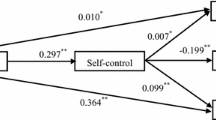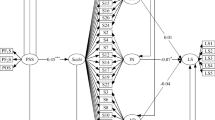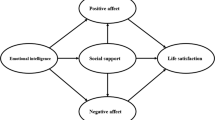Abstract
This study examined the mediating effect of core self-evaluations on the relationship between social support and life satisfaction in Chinese adults. Three hundred and forty-two (141 males and 201 females) from Mainland China completed the Multi-Dimensional Scale of Perceived Social Support, the Core self-evaluations scale and the Satisfaction with Life Scale. Correlational results indicated that social support was associated with core self-evaluations and life satisfaction, and core self-evaluations were associated with life satisfaction. Results using structural equation modeling showed that core self-evaluations partially mediated the relationship between social support and life satisfaction. Moreover, multi-group analyses indicated that the paths in the mediation model did not differ across gender. The significance and limitations of the results are discussed.

Similar content being viewed by others
References
Akaike, H. (1987). Factor analysis and AIC. Psychometrika, 52, 317–332.
Anderson, J. C., & Gerbing, D. W. (1988). Structural equation modeling in practice: A review and recommended two-step approach. Psychological Bulletin, 103, 411–423.
Anderson, E. S., Wojcik, J. R., Winett, R. A., & Williams, D. M. (2006). Social-cognitive determinants of physical activity: The influence of social support, self-efficacy, outcome expectations, and self-regulation among participants in a church-based health promotion study. Health Psychology, 25, 510.
Arbuckle, J. L. (2003). AMOS 5.0 update to the AMOS user’s guide. Chicago, IL: Smallwaters.
Au, A., Lai, M. K., Lau, K. M., Pan, P. C., Lam, L., Thompson, L., et al. (2009). Social support and well-being in dementia family caregivers: The mediating role of self-efficacy. Aging & Mental Health, 13, 761–768.
Bowling, N. A., Wang, Q., Tang, H. Y., & Kennedy, K. D. (2010). A comparison of general and work-specific measures of core self-evaluations. Journal of Vocational Behavior, 76, 559–566.
Brown, G. W., Andrews, B., Harris, T., Adler, Z., & Bridge, L. (1986). Social support, self-esteem and depression. Psychological Medicine, 16, 813–831.
Browne, M. W., & Cudeck, R. (1993). Alternative ways of assessing model fit. Newbury Park, CA: Sage.
Brunborg, G. S. (2008). Core Self-Evaluations. European Psychologist, 13, 96–102.
Chamberlain, K. (1988). On the structure of subjective well-being. Social Indicators Research, 20, 581–604.
Cohen, S., & Wills, T. A. (1985). Stress, social support, and the buffering hypothesis. Psychological Bulletin, 98, 310–357.
Cooper, H., Okamura, L., & Gurka, V. (1992). Social activity and subjective well-being. Personality and Individual Differences, 13, 573–583.
Davis, M. C., & Swan, P. D. (1999). Association of negative and positive social ties with fibrinogen levels in young women. Health Psychology, 18, 131–139.
Diener, E. (1994). Assessing subjective well-being: Progress and opportunities. Social Indicators Research, 31, 103–157.
Diener, E., Emmons, R. A., Larsen, R. J., & Griffin, S. (1985). The satisfaction with life scale. Journal of Personality Assessment, 49, 71–75.
Diener, E., & Oishi, S. (2005). The nonobvious social psychology of happiness. Psychological Inquiry, 16, 162–167.
Diener, E., & Seligman, E. (2002). Very happy people. Psychological Science, 13, 81–84.
Drake, K. E., Sheffield, D., & Shingler, D. (2011). The relationship between adult romantic attachment anxiety, negative life events, and compliance. Personality and Individual Differences, 50, 742–746.
Ferris, D. L., Rosen, C. R., Johnson, R. E., Brown, D. J., Risavy, S. D., & Heller, D. (2011). Approach or avoidance (or both?): Integrating core self-evaluations within an approach/avoidance framework. Personnel Psychology, 64, 137–161.
Gallagher, E. N., & Vella-Brodrick, D. A. (2008). Social support and emotional intelligence as predictors of subjective well-being. Personality and Individual Differences, 44, 1551–1561.
Hoffman, M. A., Ushpiz, V., & Levy-Shiff, R. (1988). Social support and self-esteem in adolescence. Journal of Youth and Adolescence, 17, 307–316.
Hu, L. T., & Bentler, P. M. (1999). Cutoff criteria for fit indexes in covariance structure analysis: Conventional criteria versus new alternatives. Structural Equation Modeling, 6, 1–55.
Judge, T. A., Bono, J. E., Erez, A., & Locke, E. A. (2005). Core self-evaluations and job and life satisfaction: the role of self-concordance and goal attainment. Journal of Applied Psychology, 90, 257.
Judge, T. A., Erez, A., Bono, J. E., & Thoresen, C. J. (2003). The core self-evaluations scale: Development of a measure. Personnel Psychology, 56, 303–331.
Judge, T. A., Hurst, C., & Simon, L. S. (2009). Does it pay to be smart, attractive, or confident (or all three)? Relationships among general mental ability, physical attractiveness, core self-evaluations, and income. Journal of Applied Psychology, 94, 742.
Judge, T. A., Van Vianen, A. E. M., & De Pater, I. E. (2004). Emotional stability, core self-evaluations, and job outcomes: A review of the evidence and an agenda for future research. Human performance, 17, 325–346.
Kahn, J. H., Hessling, R. M., & Russell, D. W. (2003). Social support, health, and well-being among the elderly: What is the role of negative affectivity? Personality and Individual Differences, 35, 5–17.
Karademas, E. C. (2006). Self-efficacy, social support and well-being: The mediating role of optimism. Personality and Individual Differences, 40, 1281–1290.
Kong, F., & You, X. (2011). Loneliness and self-esteem as mediators between social support and life satisfaction in late adolescence. Social Indicators Research. doi:10.1007/s11205-011-9930-6.
Kong, F., Zhao, J., & You, X. (2012a). Social support mediates the impact of emotional intelligence on mental distress and life satisfaction in Chinese young adults. Personality and Individual Differences, 53, 513–517.
Kong, F., Zhao, J., & You, X. (2012b). Emotional intelligence and life satisfaction in Chinese university students: The mediating role of self-esteem and social support. Personality and Individual Differences, 53, 1039–1043.
Lucas, R. E., Diener, E., & Suh, E. (1996). Discriminant validity of well-being measures. Journal of Personality and Social Psychology, 71, 616–628.
Meyerson, P., & Tryon, W. W. (2003). Validating Internet research: A test of the psychometric equivalence of Internet and in-person samples. Behavior Research Methods, 35, 614–620.
Mikulincer, M., & Florian, V. (1998). The relationship between adult attachment styles and emotional and cognitive reactions to stressful events. In J. A. Simpson & W. S. Rhodes (Eds.), Attachment theory and close relationships (pp. 143–165). New York: Guilford.
Piccolo, R. F., Judge, T. A., Takahashi, K., Watanabe, N., & Locke, E. A. (2005). Core self-evaluations in Japan: Relative effects on job satisfaction, life satisfaction, and happiness. Journal of Organizational Behavior, 26, 965–984.
Reis, O., Dörnte, M., & von der Lippe, H. (2011). Neuroticism, social support, and the timing of first parenthood: A prospective study. Personality and Individual Differences, 50, 381–386.
Saltzman, K. M., & Holahan, C. J. (2002). Social support, self-efficacy, and depressive symptoms: An integrative model. Journal of Social and Clinical Psychology, 21, 309–322.
Sarason, I. G., Levine, H. M., Basham, R. B., & Sarason, B. R. (1983). Assessing social support: The social support questionnaire. Journal of Personality and Social Psychology, 44, 127.
Shen, Y. E. (2009). Relationships between self-efficacy, social support and stress coping strategies in Chinese primary and secondary school teachers. Stress and Health, 25, 129–138.
Shrout, P. E., & Bolger, N. (2002). Mediation in experimental and nonexperimental studies: New procedures and recommendations. Psychological Methods, 7, 442–445.
Steese, S., Dollette, M., Phillips, W., Hossfeld, E., Matthews, G., & Taormina, G. (2006). Understanding girls’ circle as an intervention on perceived social support, body image, self-efficacy, locus of control, and self-esteem. Adolescence, 41, 55–74.
Swickert, R. J., Hittner, J. B., Harris, J. L., & Herring, J. A. (2002). Relationships among internet use, personality, and social support. Computers in Human Behavior, 18, 437–451.
Tsaousis, I., Nikolaou, I., Serdaris, N., & Judge, T. A. (2007). Do the core self-evaluations moderate the relationship between subjective well-being and physical and psychological health? Personality and Individual Differences, 42, 1441–1452.
VanderZee, K. I., Buunk, B. P., & Sanderman, R. (1997). Social support, locus of control, and psychological well-being. Journal of Applied Social Psychology, 27, 1842–1859.
Wills, T. A. (1991). Social support and interpersonal relationships. In M. S. Clark (Ed.), Prosocial behavior (pp. 265–289). Newbury Park, CA: Sage.
Wills, T. A., & Fegan, M. F. (2001). Social networks and social support. In A. Baum, T. A. Revenson, & J. E. Singer (Eds.), Handbook of health psychology (pp. 209–234). Mahwah, NJ: Erlbaum.
Yarcheski, A., Mahon, N. E., & Yarcheski, T. J. (2001). Social support and well-being in early adolescents: The role of mediating variables. Clinical Nursing Research, 10, 163–181.
Zellars, K. L., & Perrewé, P. L. (2001). Affective personality and the content of emotional social support: Coping in organizations. Journal of Applied Psychology, 86, 459.
Zimet, G. D., Dahlem, N. W., Zimet, S. G., & Farley, G. K. (1988). The multidimensional scale of perceived social support. Journal of Personality Assessment, 52, 30–41.
Author information
Authors and Affiliations
Corresponding author
Rights and permissions
About this article
Cite this article
Song, G., Kong, F. & Jin, W. Mediating Effects of Core Self-Evaluations on The Relationship Between Social Support and Life Satisfaction. Soc Indic Res 114, 1161–1169 (2013). https://doi.org/10.1007/s11205-012-0195-5
Accepted:
Published:
Issue Date:
DOI: https://doi.org/10.1007/s11205-012-0195-5




